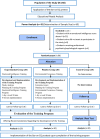Program development study focusing on emotional intelligence skills of nursing students: randomized controlled trial
- PMID: 40624641
- PMCID: PMC12232706
- DOI: 10.1186/s12912-025-03491-1
Program development study focusing on emotional intelligence skills of nursing students: randomized controlled trial
Abstract
Background: Emotional intelligence is crucial in nursing care. This study aimed to develop and evaluate an emotional intelligence training program based on Demirel's Program Development Model and Bar-On EQ Model.
Methods: The study is a randomized controlled trial with experimental, placebo, and control groups. The study was conducted with the population of the first year students (n:250) studying in the nursing faculty of a research university. The students were randomly placed in experimental (n = 20), control (n = 20), and placebo (n = 20) groups. Bar-On Emotional Quotient Inventory (EQ-i) was used to measure emotional intelligence. The intervention lasted 8 weeks. Blinding and synchronized placebo training were applied to minimize bias. The Emotional Intelligence Training Program developed, was applied as the intervention in the study. In order to minimize the risk of interaction, a different training program was synchronously applied to the placebo group. In order to create the illusion that the training initiative was the same for this group, a training initiative on environmental awareness, which is a different subject, was applied in the same number of sessions and duration. In the analysis of the data, SPSS 25 package software were employed.
Results: In the measurements performed following the training intervention, it was determined that the students in the experimental group had significantly higher emotional intelligence mean score compared to pre-training period mean score and the students in the placebo and control groups. The post-training emotional intelligence scores (Mean ± SD) were: Experimental group 3.66 ± 0.13, Control group 3.11 ± 0.30, Placebo group 3.35 ± 0.28. The experimental group showed significant improvement. The pre-training and post-training emotional intelligence scores (Mean ± SD) were: Experimental group: 3.22 ± 0.63 (pre), 3.66 ± 0.13 (post); Control group: 3.28 ± 0.62 (pre), 3.11 ± 0.30 (post); Placebo group: 3.51 ± 0.49 (pre), 3.35 ± 0.28 (post). The experimental group showed significant improvement (p < 0.001, d = 1.2).
Conclusions: In conclusion, it was observed that the emotional intelligence training program developed and applied to the nursing students was effective in increasing total emotional intelligence scores by approximately 13.7% compared to the pre-training level. The findings indicate that the program can effectively enhance emotional intelligence in nursing students and is applicable within nursing curricula.'
Trial registration: The study was conducted in line with the CONSORT diagram. The study registered ClinicalTrials.gov. ID: NCT05379361 (date: 2022-05-17).
Keywords: Education; Emotional intelligence; Nursing; Randomized controlled trials; Students.
© 2025. The Author(s).
Conflict of interest statement
Declarations. Ethics approval and consent to participate: In this study, all methods were performed in accordance with the relevant guidelines and regulations. Ethics Committee approval (dated x and numbered y) and written institutional permission from the faculty where the study was conducted were obtained for the study. In addition, the students’ written consents and the author’s permission to use the scale were obtained as well. Our manuscript is a quantitative research article, in which the necessary data was obtained by filling out a questionnaires, and at the beginning of the questionnaires, informed consent was obtained from the nursing students to participate in the study. Participants were assured of the confidentiality of the information. Approval was obtained from the ethics committee regarding the educational content and process implemented as an initiative. The ethics committee approval (from the Istanbul University-Cerrahpaşa Social and Humanities Research Ethics Committee, date: 07.05.2018 issue: 48747) and the informed consents of the participants were obtained. The study was based on volunteering. Consent for publication: Not applicable.
Figures
Similar articles
-
Interventions for the treatment of brain radionecrosis after radiotherapy or radiosurgery.Cochrane Database Syst Rev. 2018 Jul 9;7(7):CD011492. doi: 10.1002/14651858.CD011492.pub2. Cochrane Database Syst Rev. 2018. PMID: 29987845 Free PMC article.
-
Short- and Longer-Term Effects of Three Intensive Straw Phonation Interventions on the Voice of Female Speech-Language Pathology Students With Mild Dysphonia: A Randomized Controlled Trial.Int J Lang Commun Disord. 2025 Jul-Aug;60(4):e70070. doi: 10.1111/1460-6984.70070. Int J Lang Commun Disord. 2025. PMID: 40622079 Clinical Trial.
-
Sertindole for schizophrenia.Cochrane Database Syst Rev. 2005 Jul 20;2005(3):CD001715. doi: 10.1002/14651858.CD001715.pub2. Cochrane Database Syst Rev. 2005. PMID: 16034864 Free PMC article.
-
Systemic pharmacological treatments for chronic plaque psoriasis: a network meta-analysis.Cochrane Database Syst Rev. 2021 Apr 19;4(4):CD011535. doi: 10.1002/14651858.CD011535.pub4. Cochrane Database Syst Rev. 2021. Update in: Cochrane Database Syst Rev. 2022 May 23;5:CD011535. doi: 10.1002/14651858.CD011535.pub5. PMID: 33871055 Free PMC article. Updated.
-
Interventions for patients and caregivers to improve knowledge of sickle cell disease and recognition of its related complications.Cochrane Database Syst Rev. 2016 Oct 6;10(10):CD011175. doi: 10.1002/14651858.CD011175.pub2. Cochrane Database Syst Rev. 2016. PMID: 27711980 Free PMC article.
References
-
- Gómez-Leal R, Holzer AA, Bradley C, Fernández-Berrocal P, Patti J. The relationship between emotional intelligence and leadership in school leaders: A systematic review. Camb J Educ. 2022;52(1):1–21.
-
- Hwang WJ, Park EH. Developing a structural equation model from grandey’s emotional regulation model to measure nurses’ emotional labor, job satisfaction, and job performance. Appl Nurs Res. 2022;64:151557. - PubMed
-
- Walker SA, Double KS, Kunst H, Zhang M, MacCann C. Emotional intelligence and attachment in adulthood: A meta-analysis. Pers Indiv Differ. 2022;184:111174.
-
- Bar-On R. The Bar-On model of emotional-social intelligence (ESI). Psicothema. 2006;13–25. - PubMed
Associated data
LinkOut - more resources
Full Text Sources
Medical



